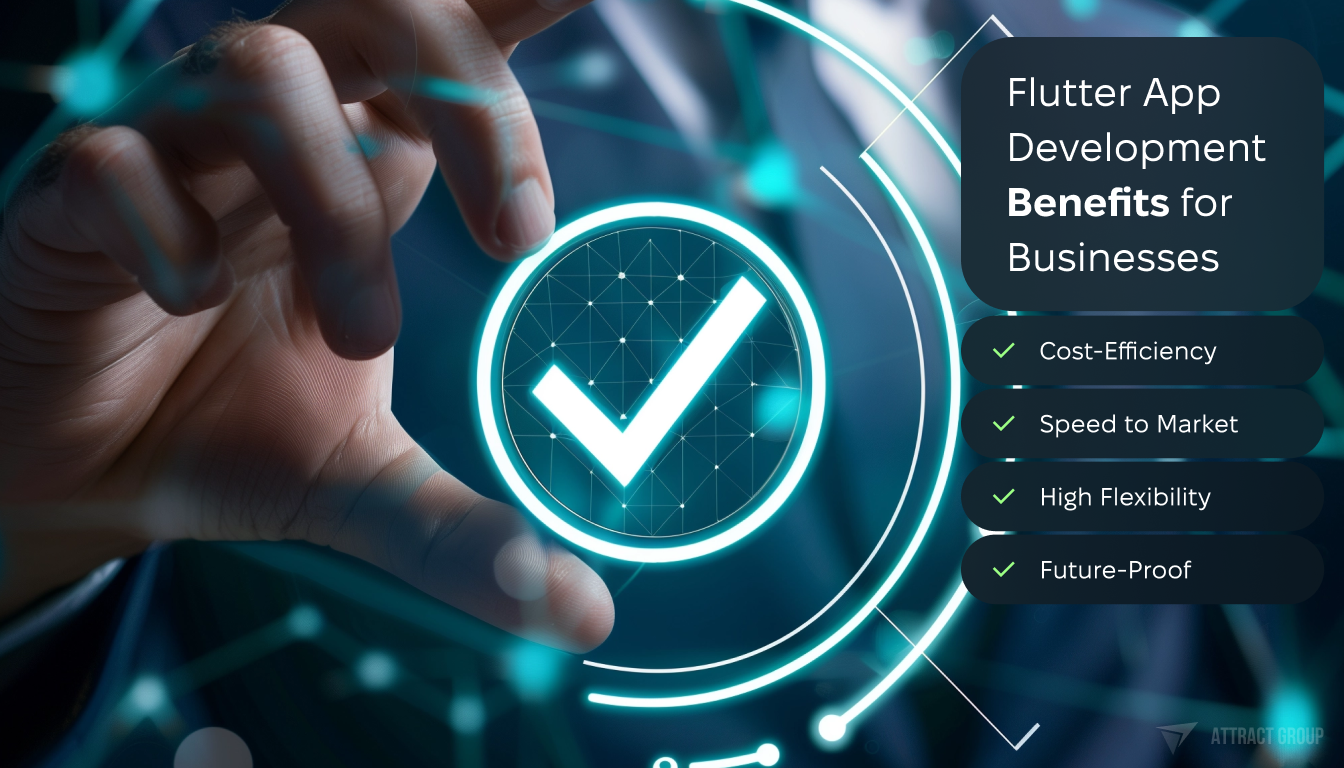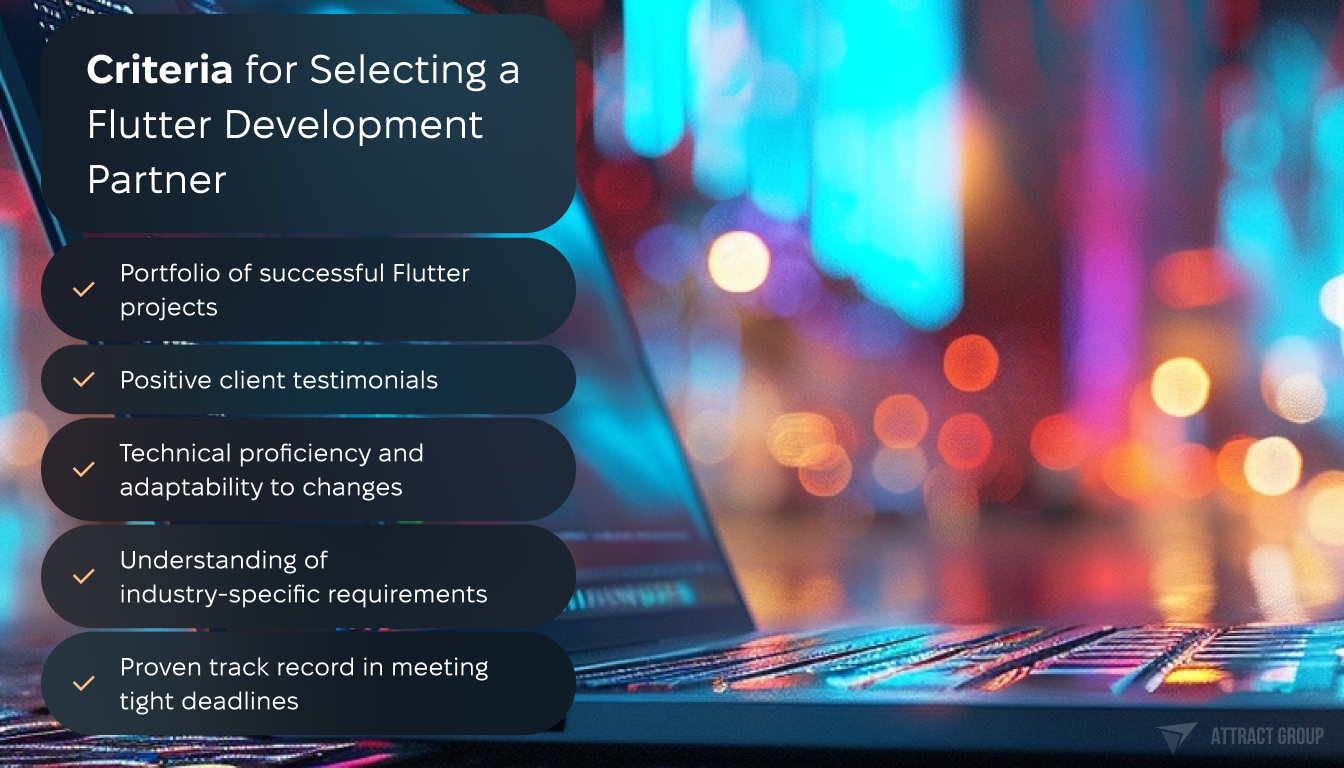Flutter App Development: Unleashing Cross-Platform Excellence
 15 April 2024
15 April 2024? Listen to the Summary of this article in Audio
Within the dynamic sphere of application creation, Flutter app development paves the way for unparalleled cross-platform excellence. As the brainchild of Google, Flutter serves as the backbone for developers aiming to build visually striking and functionally robust apps across diverse digital landscapes. This open-source marvel simplifies intricate processes, allowing for the seamless birth of applications transcending the barriers of mobile, web, and desktop realms under a unified codebase.
Advancing beyond traditional confines, Flutter services revolutionize user experiences by delivering applications that not only look native but also perform with the fluidity synonymous with platform-specific builds. As businesses demand presence across iOS and Android, Flutter stands as the linchpin for Flutter app developers, equipping them with a plethora of customizable widgets designed to captivate and engage. Moreover, the adoption of Firebase amplifies Flutter’s prowess, bestowing developers with the capability to effectively scale businesses through an array of cloud-based, growth-centric tools.
The hallmark of Flutter’s innovation is encapsulated in its ‘hot reload’ feature, which significantly enhances development speed by enabling immediate code updates for instantaneous visual feedback. Efficiency, therefore, becomes the default, not a luxury, ensuring swift, quality-driven development cycles. Google’s continuous infusion of ingenuity into Flutter guarantees that applications crafted today will stride confidently into tomorrow, setting a benchmark for cross-platform excellence.
Key Takeaways
- Flutter enables the creation of natively compiled applications across multiple platforms from a single codebase.
- Customizable widgets and integration with Firebase significantly enhance user experience and business scalability.
- ‘Hot reload’ propels development efficiency by showing real-time updates within the app environment.
- Cost and time efficiency of Flutter app development offers businesses a competitive edge in the market.
- Backed by Google, Flutter’s ever-evolving toolkit remains future-proof in the burgeoning landscape of cross-platform apps.
Introduction to Flutter and Its Rising Popularity
In the realm of mobile application development, one term has been especially buzzworthy: Flutter app development. This innovative framework is quickly establishing a substantial presence as it redefines the creation of cross-platform applications. Flutter’s approach simplifies the development process by unifying it under one common language and set of libraries. As businesses and developers continue to seek out robust, versatile, and cost-effective solutions, development becomes an increasingly attractive option.
What Is Flutter App Development?
Understanding the essence of Flutter app development begins with recognizing its core as an open-source UI framework backed by Google. It utilizes Dart — a modern, concise, and powerful programming language — to enable developers to build natively compiled applications. This cross-platform toolkit promises high-fidelity and performance on both iOS and Android devices from a single codebase, distinguishing it from other development frameworks that often require separate builds for each platform.
Why Flutter? Key Advantages for Modern App Development
The popularity of Flutter lies in its numerous intrinsic advantages. Is Flutter free? Absolutely, its open-source nature welcomes developers to explore and integrate it into their projects without financial constraints. The benefits of Flutter app development shine in its rich catalog of customizable widgets, its aesthetically pleasing and native-feeling UI components, and its game-changing ‘hot reload’ feature. These elements collectively empower a more agile and responsive design process, underscore cross-platform app performance, and reduce the need for frequent rebuilds during development.
Flutter App Development Benefits for Businesses
- Cost-Efficiency: By requiring a singular codebase for multiple platforms, businesses save on development costs.
- Speed to Market: Flutter’s hot reload feature significantly cuts down iteration times, allowing businesses to release their apps more rapidly.
- High Flexibility: The variety of Flutter’s widgets offers ample opportunities for customization to perfectly align with brand aesthetics.
- Future-Proof: As a Google product, Flutter is consistently updated, ensuring applications remain up-to-date with the latest tech standards.
How Flutter Enhances Cross-Platform App Performance
When discussing cross-platform app performance, Flutter truly excels. It provides the same user experience as native apps by directly compiling to native code, thus reducing potential performance issues often associated with interpreted approaches. Furthermore, Flutter’s layered architecture allows full customization, which translates to optimized performance and the ability to achieve 60 FPS (frames per second) animation speeds. It’s these qualities that solidify the framework’s standing as a formidable player in the world of cross-platform development.

Schedule a free call with our Flutter experts to discuss your app goals, features, and timeline. We provide estimates to turn your vision into reality.
The Flutter Ecosystem: Tools and Flutter Services
The Flutter ecosystem is a comprehensive suite of tools and services that empower mobile development. It’s a synergistic environment that nurtures creativity and efficiency, addressing the challenges of modern app development. At its foundation, Flutter offers a rich collection of widgets and pivotal features like the hot reload capability, which have become staples for developers seeking agility and precision. In addition, an active community and extensive third-party resources provide substantial support, ensuring that diverse project requirements are met with finesse and adaptability.
Flutter Mobile Development: A Comprehensive Guide
Embarking on Flutter mobile development is an expedition into a realm where coding efficiency meets aesthetic flexibility. Developers find themselves equipped with a range of widgets and the ability to implement changes in real-time, without the typical delay of traditional app development. Flutter’s robust documentation and resources serve as a beacon, guiding developers through setup, execution, and scaling of projects with remarkable ease and effectiveness.
The Role of Flutter App Developers in Your Project
Flutter app developers play a pivotal role in transforming your project visions into tangible app experiences. Their mastery of Flutter services and diligent application of best practices breathe life into applications, ensuring they are not only functional but also resonate with users across platforms. By leveraging Flutter’s streamlined workflow, developers are positioned to provide sophisticated solutions with the agility that today’s fast-paced digital landscape demands.
| Feature | Description | Advantages |
|---|---|---|
| Hot Reload | A feature allowing instant UI updates and state retention. | Enhances developer productivity and encourages UI/UX experimentation. |
| Single Codebase | One codebase for iOS and Android platforms. | Drastically reduces development time and resource allocation. |
| Firebase Integration | Seamless connection with a suite of Google’s cloud services. | Enables scalable backend services such as databases, authentication, and analytics. |
| Customizable Widgets | Modular UI components for crafting a custom look and feel. | Facilitates brand-specific app designs with engaging user interfaces. |
| Community Support | An active ecosystem with extensive documentation and resources. | Provides collaboration, support, and the sharing of best practices. |
In essence, the Flutter ecosystem is a catalyst for innovation, providing Flutter app developers with a robust and flexible platform. By embracing Flutter services, businesses can deploy captivating and responsive applications, heralding a new era of cross-platform development marked by exceptional performance and user-centric design.
Choosing the Right Flutter App Development Company
Selecting the ideal Flutter app development company is a strategic choice that can determine the success of your digital project. The partnership with a development team adept in Flutter’s nuanced toolkit is instrumental for crafting applications that are not only efficient and high-performing but also future-ready and adaptable to the evolving tech landscape.
Criteria for Selecting a Flutter Development Partner
When it comes to picking a Flutter development partner, several criteria stand out that should guide your decision. The company’s portfolio, client feedback, and how they have maneuvered past projects give insight into their capability to execute tasks aligning with your specific requirements. A proficient Flutter app development company should exhibit a balanced mix of creative flair and technical expertise, tailoring their services to your business’s unique touchpoints and objectives.
- Portfolio of successful Flutter projects
- Positive client testimonials and case studies
- Technical proficiency and adaptability to changes
- Understanding of industry-specific requirements
- Proven track record in meeting tight deadlines
The Importance of Experience and Expertise
The experience and expertise of a Flutter app development company are critical components that can vastly influence the outcome of your application. Companies with an extensive track record of versatile projects indicate that they can handle the diverse challenges that may arise during development. Their knack for problem-solving and the ability to communicate promptly are significant assurances for any collaborative project.
Moreover, the utilization of innovative tools and technologies, such as Code Magic for continuous integration and delivery, signifies a team’s dedication to efficiency and quality. Engaging with a team that prioritizes staying ahead of technology curves reassures you that your app will be enduring and credible in a competitive market.
| Consideration | Why It Matters | What to Look For |
|---|---|---|
| Company’s Experience | Indicates the company’s ability to navigate complex projects and deliver solutions. | Diversity in app genres, client retention rate. |
| Technical Expertise | Crucial for implementing modern solutions and overcoming development hurdles. | Certifications, technologies mastered, approach to new challenges. |
| Client Testimonials | Reflects the company’s reliability and quality of service. | Client retention, satisfaction scores, detailed reviews. |
| Collaborative Process | Ensures that the development process is seamless and aligned with your vision. | Transparency in communication, feedback incorporation, regular updates. |
| Future-Proofing | Guarantees that the app remains relevant and up-to-date with technological advancements. | Use of cutting-edge tools, updates strategy, post-launch support. |
In your quest for the ideal development partner, weigh their competencies and alignment with your strategic goals. A Flutter app development company that bridges innovation with a results-driven approach can catalyze your venture’s success in the digital ecosystem. Seize the partnership that promises a harmonious blend of experience, technical skills, and a track record of delivering remarkable Flutter applications.

Our Flutter developers can build your cross-platform vision into an engaging, high-performing product. Let’s discuss how Flutter can meet your needs.
Flutter App Development Cost Factors
Embarking on the Flutter app dev journey brings to light key influences that frame the economic landscape of app creation. Touted for its cost benefits, Flutter exists as a beacon of efficiency in the cross-platform development arena. However, to accurately gauge how much app development costs when using Flutter, a nuanced understanding of the developmental intricacies is paramount.
How Much Does App Development Cost with Flutter?
The inquiry, how much app development costs with Flutter, invokes a multifaceted response. Costs can fluctuate widely, pivoting on the complexity of the application, diversity of features demanded, and the caliber of developers onboarded. Typically, these costs are segmented into stages inclusive of design, development, testing, and deployment. Flutter, by virtue of its unified codebase, streamlines the process, mitigating expenses by consolidating the workforce and hours invested.
Cost Comparison: Flutter vs Other Cross-Platform Solutions
A judicious cost comparison between Flutter and alternative cross-platform frameworks reveals compelling financial advantages. Frameworks that necessitate distinctive codebases for iOS and Android, conversely, elevate costs, stemming from an expanded developmental roster and elongated timelines. Flutter’s single codebase philosophy circumvents this financial heft, showcasing a prudent approach to cross-platform application development.
Budgeting for Your Flutter App Dev Project
Successful budgeting requires a comprehensive overlook of the entire development lifecycle. Prospective Flutter app dev projects must account for the cost of integrations, be it through Firebase services or third-party plugins, which could impact the overall cost constitution. These forecasts pave the way for proactive project management and a thorough financial plan, striking a balance between ambition and pragmatism.
| Development Phase | Considerations | Typical Cost Range |
|---|---|---|
| Design | User Interface, User Experience, Prototyping | $5,000 – $20,000 |
| Development | Codebase, Features, Flutter’s Widgets | $10,000 – $50,000 |
| Testing | Quality Assurance, Beta Testing | $5,000 – $15,000 |
| Deployment | App Store Optimization, Launch Strategy | $1,000 – $5,000 |
| Maintenance | Updates, Backend Support | $500 – $5,000 monthly |
Evidently, the totality of the Flutter app dev cost spectrum is influenced by individual project dynamics and the suite of functionalities envisioned. Recognizing these factors and preparing a deft budgeting plan lays the groundwork for successful, economical, and high-caliber app development.
How Many Developers to Build an App with Flutter?
As the mobile app market evolves, so does the strategy for app development, particularly when exploring the efficient use of Flutter. A critical factor in planning a Flutter project is determining how many developers to build an app. This number can vary considerably depending on project size, complexity, and the specific demands it encompasses.
The initial team composition might start small, but as the development phase progresses, scaling your team may become necessary. A project’s scope can expand over time, requiring a synergistic team capable of adapting to new challenges without disrupting the application’s development pace or impacting its overall quality.
Team Composition for Efficient Flutter Development
Effective flutter app creation often incorporates a multidisciplinary team, with each member bringing unique skills to the table. Even a small app can require a mix of talents, including a project manager to steer the project’s direction, a UX/UI designer to ensure the app’s interface is user-friendly, and at least one or two Flutter developers for the core development tasks.

Scaling Your Team for Flutter App Development
It is not uncommon for project requirements to grow, calling for additional resources. When scaling your team, it’s essential to sustain a structured and strategic approach. New hires should fill specific roles, ensuring the project benefits from the expansion. This might include additional Flutter developers or specialists in areas like back-end integration, particularly as apps integrate more complex features or target additional platforms.
| Role | Responsibility | Value to Project |
|---|---|---|
| Project Manager | Oversees the app development process and coordinates team efforts | Keeps the project on track and ensures it aligns with business objectives |
| UI/UX Designer | Designs the app interface focusing on user experience | Directly impacts user engagement and satisfaction |
| Flutter Developer(s) | Develops the app using Flutter, covering both front-end and back-end necessities | Crucial for bringing the digital product to life and integrating core features |
| Quality Assurance Tester | Ensures the app is robust and bug-free | Enhances product reliability and user trust |
| Backend Developer | Handles server-side operations and database management | Supports the app’s scalability and performance |
Ultimately, the team required to construct an app with Flutter is not fixed and should be reflective of the tangible demands your project entails. Beginning with a solid foundation and scaling your team deliberately, as needed, enables the flexibility to maneuver through the developmental journey without straying from efficiency or quality outcomes.
Flutter vs Other Cross-Platform Frameworks
In the contemporary landscape of mobile app development, the choice of framework can make a significant difference in both the performance and the overall success of an application. Flutter has positioned itself as a formidable contender in the cross-platform domain, pitting its capabilities against alternatives such as React Native and Xamarin. This comparison not only highlights the technical strengths and attributes of Flutter but also illuminates the scenarios in which it outshines its competitors.
Technical Comparison: Flutter vs Competitors
Flutter’s underpinnings rest on Dart, a language optimized for UI construction and layout at a brisk pace. This contrasts sharply with React Native’s reliance on JavaScript and Xamarin’s use of C# and .NET framework. Flutter dismisses the need for a bridge to communicate with native components, a requirement in React Native that can lead to performance bottlenecks. Flutter’s compilation to native code, on the other hand, results in a more fluent user experience and faster app startup times.
| Framework | Language | Performance | UI Consistency | Development Efficiency |
|---|---|---|---|---|
| Flutter | Dart | High (Native Compilation) | High | Hot Reload, Single Codebase |
| React Native | JavaScript | Varies (Bridge to Native Modules) | Dependent on Native Modules | Live Reload, Hot Reload |
| Xamarin | C#, .NET | Good (Native Compilation) | Good | Native API Accessibility |
Furthermore, Flutter’s all-encompassing widget library and graphical engine, Skia, ensure pixel-perfect UIs on any platform, giving it an edge over other frameworks that may require more adjustments to achieve a similar level of fidelity. Another distinguishing factor is Flutter’s rich set of fully customizable widgets, which makes it possible to create bespoke UIs that stand out, an aspect that might require additional plugins or custom development when using other frameworks.
When to Choose Flutter Over Other Options
The decision to adopt Flutter over alternative cross-platform frameworks boils down to several key project requirements and goals. If your project necessitates a high level of brand expression through an intricate and detailed user interface, Flutter’s customizable widget set is invaluable. It provides a level of control and flexibility that other frameworks can struggle to match.
- If seamless, high-performance animation is a central feature of your app, Flutter’s rendering process ensures smooth and visually appealing transitions that feel native on any platform.
- When the goal is rapid iterative development coupled with immediate feedback, the ‘hot reload’ feature in Flutter vastly reduces development time, allowing for swift adjustment and enhanced productivity.
- Companies looking to future-proof their applications will find solace in Flutter’s strong backing by Google and its large, thriving community, signifying continued support and innovation.
- Lastly, when aspiring to maintain a single, unified codebase across iOS and Android platforms, Flutter’s cross-compile functionality mitigates the need for platform-specific development teams, reducing both complexity and cost.
Considering these key factors, Flutter emerges as a powerful solution for developers and businesses eager to harness the potential of cross-platform synergy while not compromising on the quality and performance that users expect from native applications.

Our expert Flutter developers can build a fully customized, brand-specific app experience. Let’s explore your objectives and possibilities.
Case Studies: Successful Flutter App Development Projects
The ascent of Flutter as a powerful framework for app development is vividly illustrated through its various case studies. These stories do more than just chart the technical triumphs of successful Flutter app development projects; they chart a narrative of innovation, strategic planning, and ingenious implementation. Let’s delve deep into the practical insights and gained wisdom that these cases offer to anyone looking to navigate the landscape of modern app development effectively.
Insights from Flutter App Development Success Stories
Through reviewing multiple successful flutter app development projects, it becomes evident that Flutter’s flexibility and rich feature set have enabled organizations across a broad array of industries to achieve their digital aspirations. A prominent instance is Hamilton Musical’s official app, which marries the sophistication of Flutter with a robust feature set, resulting in an impeccable user experience. Another notable example is Reflectly, a personal journal app crafted with Flutter, which impressively leverages AI and provides an immersive UI experience that has captivated a substantial user base. These anecdotes not only showcase the swiftness of development Flutter facilitates but also highlight the significant cost efficiencies it imbues within the project lifecycle.
Lessons Learned from Flutter Implementation
The success stories behind Flutter-powered projects bring to light invaluable implementation lessons. One such lesson is the centrality of agile methodologies that have guided teams towards reactive and adaptive development processes. Through the integration of tools like Firebase and Code Magic, businesses have accelerated not just the app development, but also testing and deployment, underscoring the importance of seamless CI/CD pipelines. Optimally, the amalgam of Flutter’s versatility and such integration tools underscores the progressive nature of today’s app development sphere. Effective collaboration between developers, designers, and stakeholders is another critical lesson, serving to enhance project outcomes and ensuring a synchronized vision from inception to launch.
| Project | Highlight | Outcome |
|---|---|---|
| Hamilton Musical App | Seamless ticketing and fan engagement | Stellar user experience driven by Flutter’s rich UI capabilities |
| Reflectly | AI-powered personal journal | High user engagement through interactive storytelling |
Thus, each case study not only serves as a testament to Flutter’s prowess but also as a harbinger of what is achievable when aligning Flutter’s comprehensive toolset with acute development foresight and strategy. These accounts are more than mere success metrics; they are a blueprint and a source of inspiration for harnessing Flutter to its full potential.
Future of Flutter in Cross-Platform App Development
The technological horizon is always expanding, and at the vanguard of this progression lies Flutter app development — Google’s visionary framework set to redefine the cross-platform space. Looking ahead, we observe a development ecosystem rapidly evolving to encompass groundbreaking features and functionalities introduced by emerging technologies.

Industry Trends and Predictions for Flutter Services
Signaling a seismic shift in the development landscape, Flutter’s ascendancy is poised for new peaks, with industry veterans spotlighting AR and VR integration as game-changers for future app experiences. These advancements foretell a significant leap in user engagement possibilities and interactivity within apps, steering the tech community towards a new frontier of immersive digital experiences.
Adoption rates are forecasted to climb, buoyed by Flutter’s nimble and scalable architecture. This growth trajectory positions Flutter not just as a toolkit for today’s needs but also as a beacon for tomorrow’s solutions. Moreover, Flutter’s consistent updates and enhancements, courtesy of Google’s persistent innovation, equip developers with a dependable and progressive toolset.
Staying Ahead with Flutter: A Look into the Future
The future is not only about embracing emerging trends but also about being well-prepared to harness them. Flutter services beckon with the promise of more holistic platform support, carving pathways for developers and enterprises to explore uncharted tech territories. Staying ahead with Flutter translates to embracing a platform that’s versatile enough to future-proof apps amid the ever-shifting technological paradigm.
Flutter’s community-forward approach guarantees a collaborative environment where developers continue to share, innovate, and refine their craft. The vitality of this community is a testament to Flutter’s resilience and adaptability, pioneering cross-platform app development not just for today’s generation, but for the proliferating digital ecosystems on the horizon.
- The integration of augmented reality (AR) and virtual reality (VR) into Flutter apps will unlock new realms for creativity and interactivity, offering transformative user experiences.
- Increasing adoption of Flutter services correlates with Google’s brisk innovation rate and the push for comprehensive platform support, ensuring flexibility and scalability.
- Flutter’s foundation in a unified codebase presents a compelling proposition for businesses, cultivating a competitive edge with reduced development time and resources.
The symbiosis of forward-thinking and technological robustness molds Flutter into an immutable part of the app development echelon, gearing up for a future where cross-platform apps are not mere commodities but essentials. As Flutter’s capabilities align with the trajectory of emerging tech trends, developers and companies will find themselves adeptly equipped to deliver experiential excellence and innovation to users worldwide.

Conclusion: Why Flutter App Development Is the Way Forward
As the digital era marches on, standing at the forefront of technological innovation becomes imperative for businesses competing in a global market. Flutter app development heralds a new epoch of digital excellence, distinguished by its capability to unite aesthetic finesse with operational dexterity. Embracing innovation within this sphere is more than a trend; it is a strategic necessity. This cross-platform toolkit provides a plethora of flutter app development benefits that magnify the allure of its adoption for ambitious enterprises.
Summarizing the Flutter App Development Benefits
The merits of Flutter in the app development landscape are extensive and compelling. At its core, the framework expedites the development process, enabling businesses to deploy apps expeditiously, thus capitalizing on market opportunities. Its single codebase design eliminates redundancy, streamlines project workflows, and reduces costs – allowing the creation of applications that are as performant as they are cost-effective. Additionally, Flutter’s vast array of widgets and tools, bolstered by Google’s unwavering support, ensures that businesses can produce apps with an exceptional, platform-consistent UI/UX. Collectively, these advantages underscore Flutter’s position as a beacon of innovation and a magnet for those who aim to dominate the application development domain.
Next Steps for Embracing Flutter in Your Business
For businesses ready to harness the potential of Flutter, the path is well-defined. Begin by identifying clear objectives for your app, considering how Flutter’s strengths can best be leveraged to meet your operation’s distinctive needs. Engage with seasoned Flutter app developers who can tailor the framework’s rich features to echo your brand’s vision. As you embark on this journey, rest assured that the robust Flutter community will be a wellspring of knowledge and support. The call to action is unequivocal: seize the transformative power of Flutter app development, and propel your business into a future where adaptability and innovation are not merely favorable but quintessential for success.
Receive a personalized estimate for your project’s design, development, testing and launch. Our team is ready to bring your app to life.
FAQ
What Is Flutter App Development?
Flutter app development involves using Google’s open-source framework to create high-quality, natively compiled applications for mobile, web, and desktop from a single codebase. It uses the Dart programming language and provides a rich set of customizable widgets.
Why Flutter? Key Advantages for Modern App Development
The key advantages of using Flutter for modern app development include its hot reload feature for instant UI updates, single codebase across platforms, beautiful and customizable widgets providing native performance, and a thriving community with robust support from Google.
How Do Flutter App Development Benefits for Businesses?
Benefits of Flutter app development for businesses include reduced time-to-market, cost efficiency due to a single codebase, aesthetic consistency across platforms, easy maintainability, and access to a wide array of plugins and tools that integrate with existing systems.
How Does Flutter Enhance Cross-Platform App Performance?
Flutter enhances cross-platform app performance by compiling to native ARM code, which results in fast app startup times and less performance issues. It also allows for a unified UI and business logic across all platforms, reducing the need for platform-specific code.
What Tools Comprise the Flutter Ecosystem?
The Flutter ecosystem consists of an array of development tools including the Flutter SDK, widgets for UI development, the Dart programming language, dev tools for debugging, and platforms for automated building and releasing apps such as Code Magic.
What Is the Role of Flutter App Developers in Your Project?
Flutter app developers play a critical role in your project as they are responsible for designing the application architecture, coding using Flutter and Dart, adding the necessary functionalities and ensuring a high-quality, performance-optimized application across platforms.
How Much Does App Development Cost with Flutter?
The cost of app development with Flutter can vary greatly depending on project complexity and scale, the geographic location of developers, and required features. However, it tends to be more cost-effective compared to native development due to its single codebase approach.
How Does a Cost Comparison Breakdown Between Flutter and Other Cross-Platform Solutions?
When compared to other cross-platform frameworks, Flutter often comes out as more cost-efficient due to its single codebase, which minimizes the need for multiple teams or doubling the workload for separate iOS and Android apps. This leads to lower development and maintenance costs over time.
What Should Be Included in Budgeting for Your Flutter App Dev Project?
Budgeting for a Flutter app development project should include design costs, development and testing, project management, and post-launch expenses such as hosting, maintenance, and updates. Factor in any additional costs for custom features or third-party integrations.
How Many Developers Are Required to Build an App with Flutter?
The number of developers required to build a Flutter app can vary based on the project’s scope and complexity. For smaller projects, a compact team comprising a couple of developers may suffice, while larger projects might need a multidisciplinary team including UI/UX designers, developers, QA testers, and a project manager.
What Is the Team Composition for Efficient Flutter Development?
An efficient Flutter development team should ideally consist of front-end and back-end Flutter developers, a UI/UX designer, a quality assurance specialist, and a project manager to oversee the process, ensuring timely delivery and alignment with project goals.
How Can You Scale Your Team for Flutter App Development?
To scale your Flutter development team, start by assessing current project needs and predict future requirements. Build a flexible team structure, consider hiring additional developers or outsourcing tasks to manage increased workload, and ensure continuous training to stay updated with Flutter’s latest features.
What Does a Technical Comparison: Flutter vs Competitors Look Like?
In a technical comparison, Flutter stands out for its widget-based architecture and ‘compile to native’ approach allowing higher performance and consistency on different platforms, whereas competitors might rely on bridge technologies leading to potential performance bottlenecks.
When to Choose Flutter Over Other Options?
Choose Flutter over other options when you need a quick development turnover with a single codebase, require a high level of design customization with consistent performance across multiple platforms, and prioritize a vibrant community with strong corporate support.
What Insights Do Flutter App Development Success Stories Provide?
Success stories typically highlight Flutter’s rapid development process, cost savings, and robust performance. They provide insights on effectively managing project complexities, focusing on user experience, and the potential for faster scaling and iteration.
What Are the Lessons Learned from Flutter Implementation?
Key lessons from Flutter implementation include starting with a clear and flexible planning stage, utilizing agile methodologies, the benefit of continuous testing and integration, and the importance of a collaborative team equipped with a good understanding of the Flutter framework.
What Are Industry Trends and Predictions for Flutter Services?
Industry trends point towards a growing adoption of Flutter due to its scalable architecture and Google’s continuous enhancements. Predictions highlight Flutter’s expanding role in incorporating emerging technologies like AR/VR and its ability to support a broader range of devices over time.
What Does Staying Ahead with Flutter: A Look into the Future Entail?
Staying ahead with Flutter involves keeping pace with technological advancements, adopting the latest tools and features released by the Flutter community, and preparing for upcoming opportunities in cross-platform development, such as integration with new platforms and technologies.
What Are the Summarized Benefits of Flutter App Development?
The summarized benefits of Flutter app development include reduced development time and costs, a single codebase for all platforms, high-quality native performance, a large library of widgets and tools, and the strong backing of Google ensuring it’s future-ready.
What Are the Next Steps for Embracing Flutter in Your Business?
The next steps for embracing Flutter in your business involve evaluating your company’s needs, assembling the right team or choosing an experienced development partner, and systematically planning for a scalable and maintainable flutter app project that meets your business goals.









